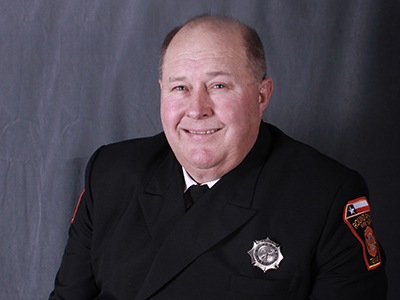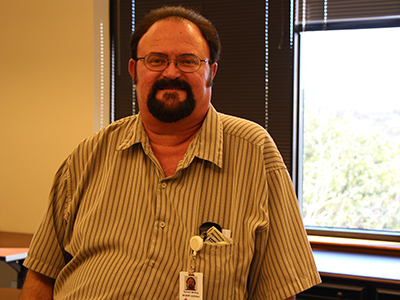Rock Beats
Two long-time employees bid farewell
Doug Nelson and Terrell Wilkey have both been with the City for 30 years and both are retiring at the end of January. Below are their reflections on their careers.
Nelson retires from Fire Department after 30 years
Doug Nelson of the Training Division in the Fire Department is retiring after 30 years with the City. His last day is Friday, Jan. 30. We caught up with Doug to get his reflections on his career, the City and fire service.
When did you start with the City?
November 2014 was 30 years. I started my fire service in Taylor. I was there for five years. Then I started in Round Rock in 1984. I was always with the Fire Department.
What was your first position?
Back then, we didn’t have positions. Everyone was a firefighter or a lieutenant. The only fire stations were Central and the old Station 2. I was assigned to Central. It was me and another guy and Lieutenant John Burton. It was just the three of us.
Did you even have a fire truck?
Yeah, we had the 1981 Seagraves that was open in the back. That was new back then. It was the first custom big truck. Station 2 still had the smaller, regular rigs.
Have things changed a lot?
Oh gosh, yes. We’ve gone from two stations to seven. We’ll be adding more with the new bond package and a training facility.
What is your background?
I’m from Hutto, a real Hippo. I was in the Air Force for four years. While I was stationed in New Mexico, I became involved in first responder duties. I would volunteer on my days off. Then I came home and got a job at Taylor with the Fire Department. That department didn’t have as many opportunities so I came to Round Rock.
What kind of training did you have to have then?
Now firefighters have to go to fire school and be an EMT (Emergency Management Technician). When I started, we did more on-the-job training. I also was an ECA (Emergency Care Attendant). Now things are more complex and more hours are required.
What would you say have been the most significant changes for the City since you started?
I think keeping up with the population growth. That’s a challenge for the Fire Department. Old Station 2 housed both the Fire and Police Department. That building had everything in it, including rodents. Then we had a lot of moving and changing as we got bigger.
What accomplishment are you proudest of?
I’d say the accomplishment I’m proudest of involves the City’s use of Compressed Air Foam (CAFs). When we first started using the tool in 2003, we weren’t taught correctly how to use it. I don’t remember who did the training but we were pumping it wrong and using it wrong. So obviously for us, it didn’t work! Change in the fire service is hard anyway and everyone had a bad impression of this tool, including me. But we had this equipment and supposedly it was beneficial. So, when I came to the training division, I started researching CAFs and discovered that we weren’t using it right. Our mixture was off and we weren’t applying it correctly. I went to training and learned how to use it correctly. I started teaching the firefighters. It took a while to change the bad reputation that equipment had in the department. People started calling me Mr. Bubbles.
But it was a really important change that makes fighting fires safer. The compressed air absorbs hydrocarbons and that means less smoke and fewer carcinogens in the air. When we started using it right, fires went out a lot quicker and safer. It uses less water. It also causes less damage to a structure than just water. It’s an important tool we can use. I’m glad I was able to make that tool effective for our department.
What do you see for the City’s future?
The biggest thing is the new fire training facility we’re building. I’m disappointed I won’t be here to use it. We’ve wanted that for a long time. It’s going to be awesome.
What are your plans for retirement?
My wife and I are staying in the area but we plan to travel. We have a motorhome and we’re planning a trip to Disneyland in California. We’ve also got some other trips planned. My wife, Janiece, retired from coaching from the Hutto School District. We’re still involved with sports programs. Volleyball has been a hobby of mine for years and I work with leagues and the YMCA.
I’ve enjoyed my time at the City. It’s been a wild ride. It doesn’t seem that long.
Wilkey retires after 30 years
Terrell Wilkey, utilities analyst with Utilities and Environmental Services, retires Jan. 30, after more than 30 years with the City. Below are his reflections on his time in public service.
What is you background?
I’m from Marlin, Texas originally. My parents still live there. I really enjoyed science and environmental studies and water treatment combined all these areas that I’m interested in. I also wanted to be in public service and the idea of protecting people’s health by keeping the water safe appealed to me. So that’s how I got into water treatment and utilities.
When did you start with the City?
I started in 1981 and stayed for a couple of years. Then I left for a couple of years and came back in 1985.
What was the Public Works department like when you started?
People don’t realize how lean we were back then. When I started, we had two computers in the whole City. I was over the water treatment and distribution system. There were two of us and the police dispatch would call us out for problems. All of our signals for the pumps and motors came over the telephone line. When it rained, they’d go out and we’d have to stay out at the plant 24 hours a day until they were fixed.
The two of us handled all of operations, including maintenance. We were entirely using ground water. We weren’t getting any surface water from anywhere.
Before Dell came, budgets were really thin. The vehicles we used had no air conditioning. We bought them second hand. I bought a microwave and refrigerator for the staff at the plant because we had no budget. I remember we would actually go to a private dump trying to scrounge scraps and paint for maintenance!
It was hard to keep staff then, too. I started calling our plant Round Rock University because I trained so many people who would get their license and then leave for another job.
What’s the biggest challenged the City faced?
I’d say getting the distribution system to match or anticipate the City’s growth. We’ve had to keep up to make sure the system is safe. Also, I’ve worked to eliminate the number of dead end mains we have in the system, because those require a lot of hands on maintenance. If you design the system well, you can eliminate the need for that. We still have a lot of them, but I’ve tried to avoid creating more than necessary.
What accomplishment are you proudest of?
I’d say my work with the charity Water for People. Our department has sponsored four or five Water for People projects and we were one of the first public utilities to be involved with the group. The work they do is so important. There are so many places where people do not have access to safe drinking water or even water at all. People have to walk miles just get water from an untreated well and then carry it back home. So many people – especially children – die from water borne diseases.
The projects that Water for People work on involve the community that they benefit, so the people learn how this new system works. It’s something I want to continue to be involved with after my retirement.
What are your plans for retirement?
At first, I’m just going to rest and relax. Some friends and I are planning a get together in New Orleans this spring. Also, I want to spend more time with my parents and take care of them. In time, I want to continue working with charities and serving the community in the best way I can. I’ve always been very committed to public service and I’m really proud of the work we do in water utilities. We play such a big role in public health and our staff works very hard.


